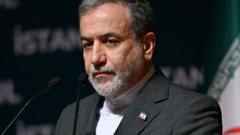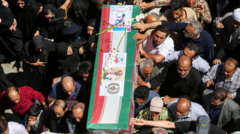In a surprising admission, Iran's Foreign Minister Abbas Araghchi stated that recent U.S. and Israeli bombings have inflicted "excessive and serious" damage to the country's nuclear facilities. This revelation contrasts sharply with the assertions made by Iran's Supreme Leader Ayatollah Ali Khamenei, who claimed the strikes have not significantly impacted Iran's nuclear program.
Iran Acknowledges Severe Damage to Nuclear Facilities Amid Tensions

Iran Acknowledges Severe Damage to Nuclear Facilities Amid Tensions
Iran’s Foreign Minister reveals significant destruction of nuclear sites caused by recent bombings, challenging official claims of no disruption.
In a televised address, Khamenei dismissed U.S. President Donald Trump's claims that the attacks had "totally obliterated" three nuclear sites, arguing that they have not achieved any meaningful result. Hours later, however, Araghchi disclosed that the Atomic Energy Organisation of Iran is currently assessing the extent of the damage, suggesting a more serious situation than Khamenei acknowledged.
Furthermore, Araghchi declared that Iran has no intentions of resuming nuclear negotiations with the U.S. Following the initiation of Israeli attacks, Iran had canceled the anticipated sixth round of talks. He emphasized that there had been no agreements or discussions aimed at restarting negotiations, reiterating that the Iranian government's approach would evolve to better serve its citizens.
In response to ongoing international pressure, the Iranian parliament has also approved a bill aimed at halting cooperation with the International Atomic Energy Agency (IAEA), signaling a potential shift away from previously permitted nuclear inspections.
Israel's military actions, which have been justified as measures to prevent alleged Iranian nuclear weapon development, have elicited direct U.S. involvement, with airstrikes targeting key facilities across Iran, including Fordo, Natanz, and Isfahan. While U.S. Defense Secretary Pete Hegseth stated that the strikes could significantly delay Iran’s nuclear capabilities, leaked Pentagon assessments suggest any delay might only last a few months, a notion the administration has since dismissed.
According to Iranian health ministry sources, the ongoing conflict has led to significant casualties—610 reported deaths in Iran compared to 28 in Israel during a relative period of escalated hostilities.
As Tehran begins to emerge from the turmoil, the ongoing confrontations continue to leave its citizens on edge.
Furthermore, Araghchi declared that Iran has no intentions of resuming nuclear negotiations with the U.S. Following the initiation of Israeli attacks, Iran had canceled the anticipated sixth round of talks. He emphasized that there had been no agreements or discussions aimed at restarting negotiations, reiterating that the Iranian government's approach would evolve to better serve its citizens.
In response to ongoing international pressure, the Iranian parliament has also approved a bill aimed at halting cooperation with the International Atomic Energy Agency (IAEA), signaling a potential shift away from previously permitted nuclear inspections.
Israel's military actions, which have been justified as measures to prevent alleged Iranian nuclear weapon development, have elicited direct U.S. involvement, with airstrikes targeting key facilities across Iran, including Fordo, Natanz, and Isfahan. While U.S. Defense Secretary Pete Hegseth stated that the strikes could significantly delay Iran’s nuclear capabilities, leaked Pentagon assessments suggest any delay might only last a few months, a notion the administration has since dismissed.
According to Iranian health ministry sources, the ongoing conflict has led to significant casualties—610 reported deaths in Iran compared to 28 in Israel during a relative period of escalated hostilities.
As Tehran begins to emerge from the turmoil, the ongoing confrontations continue to leave its citizens on edge.






















